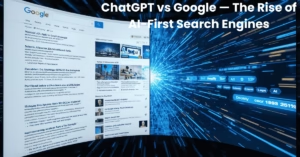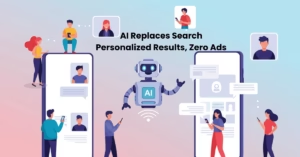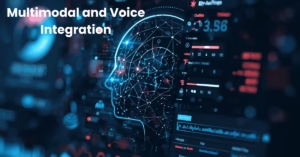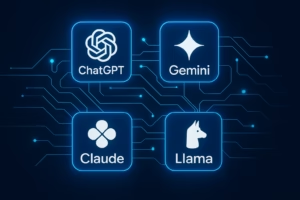Table of Contents
Introduction
The landscape of search is evolving at lightning speed. By 2027, the idea that “AI replaces search” won’t just be a concept — it’ll be our everyday reality. With tools like ChatGPT and other generative AI systems, the way we seek out information is changing dramatically. Instead of merely entering keywords and scrolling through endless links, people are now posing questions and receiving direct answers. This transition from simple searching to genuine understanding represents one of the most significant shifts in the history of the internet — a bold challenge to Google’s long-standing reign over the search landscape. Let’s dive into how ChatGPT is set to transform global search by 2027 and what this evolution means for users, content creators, and the future of the web. In this article we will learn in 2027 , how AI Replace Search. Latest update from Mindliftly .
1. AI Replaces Search — Goodbye to Keyword Queries
Traditional search engines have always depended on keywords, rankings, and backlinks. But now, AI is changing the game by introducing conversation.
Instead of typing “best laptops under $1000,” users are asking:
“Which laptop would be ideal for a student who edits videos and travels frequently?”
ChatGPT doesn’t just spit out a list — it provides a thoughtful answer.
This shift means:
- Less reliance on SEO gimmicks
- A greater emphasis on content quality and expertise
- A more personalized, engaging experience
Search Engine Journal refers to this as “the conversational revolution”, where users engage in dialogue with search, rather than just directing it.
2. ChatGPT vs Google — The Rise of AI-First Search Engines
When AI takes over search, it doesn’t just enhance Google , it completely reshapes it.
With OpenAI teaming up with Microsoft Bing and Edge Copilot, users can now bypass traditional search results entirely.
By 2027:
- AI will provide instant answers in real-time.
- Search will merge chat, visuals, and voice.
- The era of the “10 blue links” will be a thing of the past.
According to TechRadar, even Google’s latest AI Overview highlights just how swiftly the industry is evolving to embrace OpenAI’s approach.

3. AI Replaces Search — Personalized Results, Zero Ads
Imagine a world where the answers you get are tailored just for you. That’s the exciting promise of AI taking over traditional search technology.
While Google search relies on ads for revenue, ChatGPT offers results that are based on your unique context—taking into account your behavior, preferences, and what you really want to know.
Here’s a quick comparison:
| Feature | Google Search | ChatGPT AI Search |
|---|---|---|
| Model | Link-based | Conversation-based |
| Ads | Yes | None (contextual relevance only) |
| Personalization | Limited | Deeply contextual |
| Format | Links | Summaries, insights, visuals |
By 2027, users will be looking for experiences that are ad-free and focused on providing answers first—thanks to advanced AI models like GPT-6 and GPT-7.

4. Future of Search — Multimodal and Voice Integration
When AI replaces search, The future of search is all about blending different modes and integrating voice.
Multimodal ChatGPT (text + image + voice + video) means:
- Show a picture and ask questions about it.
- Get instant, conversational responses to voice queries.
- Automatically generate video summaries from transcripts.
By 2026, OpenAI’s multimodal model was already combining images and audio. Looking ahead to 2027, we can expect:
- Real-time searches through AR glasses.
- Voice-first results that work seamlessly with wearables.
As Tom’s Guide notes, AI assistants are evolving into “living search engines,” learning from visuals and sounds, not just text.

5. AI Replaces Search — The Power Shift from Links to Knowledge
In the past, search results were all about who could snag the top spot. But now, with AI taking over search, it’s really about who can offer the most valuable insights.
Creators and brands need to:
- Optimize for questions instead of just focusing on keywords.
- Emphasize EEAT (Experience, Expertise, Authoritativeness, Trustworthiness).
- Create content that AI can easily digest and summarize.
By 2027, SEO will transform into “AIO” — Artificial Intelligence Optimization.
This means we’ll need to write for both humans and AI models at the same time.
6. ChatGPT and Privacy — A Safer, Smarter Search
One big reason AI is taking over search is user trust. AI chat systems offer a private, ad-free way to explore information.
In contrast to Google, which gathers behavioral data for advertising, the upcoming memory features of ChatGPT (set to launch in 2026) will securely store your preferences right on your device, and do so in a clear and straightforward manner.
With this system, users will be able to:
- Decide what information is remembered or forgotten.
- Utilize private AI workspaces.
- Receive recommendations without the need for data profiling.
This level of transparency gives ChatGPT a significant edge in trustworthiness — a crucial factor for user adoption by 2027.
7. The Future of Search — Ecosystem Wars Begin
By 2027, the web won’t be ruled by a single AI; instead, we’ll see a whole ecosystem of AIs at play.
OpenAI (ChatGPT), Google (Gemini), Anthropic (Claude), and Meta (Llama) will all be vying for your attention in the search arena.
AI isn’t here to wipe out Google; it’s pushing for a major transformation. Get ready for a world where users hop between different AIs just like they do with search engines.
Predicted Timeline:
| Year | Milestone |
|---|---|
| 2025 | ChatGPT teams up with Bing + Edge |
| 2026 | Multimodal & voice AI search takes off |
| 2027 | ChatGPT OS + decentralized AI search engines emerge |
ChatGPT OS + decentralized AI search engines emerge

Expert Insights (External References)
- Search Engine Journal — ChatGPT vs Google Search
- TechRadar — Google’s AI Overview vs ChatGPT
- Tom’s Guide — Multimodal AI Future
- MindLiftly — Future ChatGPT Trends 2026–2027 (Internal Reference)
FAQs — AI Replaces Search
Q1. Will AI really replace Google Search by 2027?
While AI might not completely replace Google, it’s definitely going to change the way we search — making us less dependent on just clicking links. Reference: Wikipedia – ChatGPT Search
Q2. What’s the biggest difference between ChatGPT and Google Search?
Google provides links; ChatGPT offers contextual answers and detailed explanations. Reference: TechTarget – ChatGPT vs Google: How Do They Differ?
Q3. Can ChatGPT find real-time or verified information?
Absolutely! With web-connected GPT models, ChatGPT can now pull in and reference live web sources. Reference: arXiv – ChatGPT vs. Google: A Comparative Study
Q4. How does AI handle misinformation in search?
It uses model training, fact-checking, and source verification layers to minimize the chances of spreading false information.
Q5. What’s next after AI replaces search?
We’ll see AI assistants that can think, reason, and act on their own — a significant leap toward AGI (Artificial General Intelligence).Reference: Forbes – 10 Generative AI Trends in 2026
Conclusion & CTA
The idea that AI is taking over search isn’t just a catchy phrase — it’s a game-changer in how we find and access information.
By 2027, tools like ChatGPT will revolutionize search, making it more conversational, tailored to individual needs, and private.
The traditional search experience, filled with links and ads, will become a thing of the past. What lies ahead is smarter, quicker, and much more human-like.
👉 Stay ahead of the AI revolution.
Visit www.mindliftly.com for weekly deep dives into future AI trends, ChatGPT tools, and SEO transformations.
Let’s shape the next digital decade — before it searches you.
About the Author
👤 Muhammad Ibrahim – Founder of Mindliftly
Muhammad Ibrahim is a technology writer and wellness advocate who loves to dig deeper into the potential of AI to enhance mental well-being, productivity, and personal growth. An experienced researcher with years of tracking emerging technologies, he brings scientific perspective and actionable strategies to guide readers to understand AI-fueled tools for daily calm and clarity.
Through Mindliftly, Ibrahim offers guides, comparisons, and action plans that link AI innovation to people’s well-being. His vision is straightforward: to enable humans to live more conscious, stress-free lives through responsible and effective use of AI.
📩 Connect with Muhammad:
- Website: Mindliftly.com






